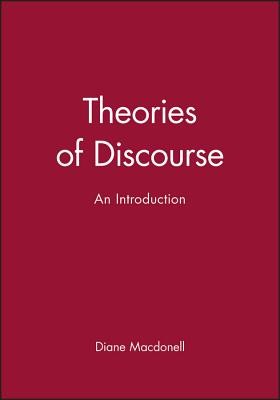
- Išsiųsime per 12–18 d.d.
- Autorius: Diane Macdonell
- Leidėjas: Blackwell Publishers
- ISBN-10: 0631148396
- ISBN-13: 9780631148395
- Formatas: 14.2 x 21.6 x 1 cm, minkšti viršeliai
- Kalba: Anglų
- Extra -15 % nuolaida šiai knygai su kodu: ENG15
Atsiliepimai
Aprašymas
This is the first critical introduction to the theories of discourse advanced by Foucault, Althusser, PUcheux and Hindess and Hirst. Discourse theory proposes that in our daily activities the way we speak and write is shaped by the structures of power in our society, and that because our society is defined by struggle and conflict our discourses reflect and create conflicts. The words, expressions and forms of knowledge in institutions (schools and universities, the church and the media) become political as they are traversed and rearranged by the pressure of forces. Diane Macdonell reveals the various lines of thought in recent work on discourse, showing how the central conception of discourse as a political and social tool could diversify into several different critical theories and ideologies.
This book is of particular interest as it calls for a reappraisal of Althusser whose work, Macdonell argues, has been wrongly debunked. This is the first overview and introduction to a notoriously complex area of critical theory, an area which is at the heart of debates about form, meaning, ideology, literary criticism and the humanities.
EXTRA 15 % nuolaida su kodu: ENG15
Akcija baigiasi už 3d.10:34:12
Nuolaidos kodas galioja perkant nuo 10 €. Nuolaidos nesumuojamos.

- Autorius: Diane Macdonell
- Leidėjas: Blackwell Publishers
- ISBN-10: 0631148396
- ISBN-13: 9780631148395
- Formatas: 14.2 x 21.6 x 1 cm, minkšti viršeliai
- Kalba: Anglų Anglų
This is the first critical introduction to the theories of discourse advanced by Foucault, Althusser, PUcheux and Hindess and Hirst. Discourse theory proposes that in our daily activities the way we speak and write is shaped by the structures of power in our society, and that because our society is defined by struggle and conflict our discourses reflect and create conflicts. The words, expressions and forms of knowledge in institutions (schools and universities, the church and the media) become political as they are traversed and rearranged by the pressure of forces. Diane Macdonell reveals the various lines of thought in recent work on discourse, showing how the central conception of discourse as a political and social tool could diversify into several different critical theories and ideologies.
This book is of particular interest as it calls for a reappraisal of Althusser whose work, Macdonell argues, has been wrongly debunked. This is the first overview and introduction to a notoriously complex area of critical theory, an area which is at the heart of debates about form, meaning, ideology, literary criticism and the humanities.


Atsiliepimai